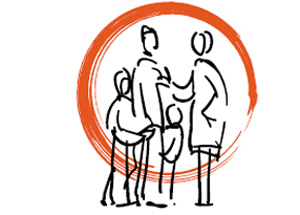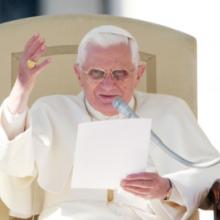Conservatives
Fundraising for the flagship anti-poverty program of the U.S. Catholic bishops is slowly recovering after being battered by the recession and sharp attacks on its mission.
Officials at the Catholic Campaign for Human Development said that when 2012 collections are tallied after June 30, the program will match or slightly exceed last year’s mark of about $9.5 million. While that is still significantly down from the $12 million that the nationwide campaign was netting a few years ago, the upward trend is reassuring.
“We are pretty optimistic,” said Ralph McCloud, director of the CCHD. McCloud said he was still cautious, given the uncertain nature of the economy, but added that “if things keep going the way they have been, we could see a bit of an upswing.”
Conservatives have united around immigration reform. Over two dozen signed a statement supporting legislation to overhaul US immigration laws. They feel the current Senate legislation is a "importnat starting point." The Associated Press reports:
In a statement being released Thursday, the officials say: "Simply opposing immigration reform should not be the conservative response to this problem. We believe conservatives should be leading the way on this issue by supporting legislation that upholds conservative principles."
Read more here.
As Americans, we live in a culture that is hyper-individuated, fragmented, and dehumanizing as it pushes a mantra of success based on material accumulation and power. Being in community with others is the countercultural answer to this. Doing so with others unlike ourselves is an important part of this. At the end of the day, above the polarization and partisanship, there is much we can do to promote the common good together. As Maddie put it at a meeting that brought Christians of opposing social interpretations together, "We may never agree on some issues, but that is not why we're here; we're good people, you're good people, let's do good together."
Since the moment of his election on March 13, Pope Francis has been warmly embraced by his own flock and even the media and the wider public in a way his bookish predecessor, Benedict XVI, was not.
Such an effusive welcome is especially good news for Catholic leaders who spent years fending off criticism of Vatican dysfunction under Benedict and a cloud of scandal and crisis at home. And the hot start for Francis is also crucial in building up a reservoir of good will that will be needed when the new pope refuses to bend on unpopular teachings or commits a gaffe of his own. Polls show that anywhere from 73 percent to 88 percent of American Catholics say they are happy with the selection of Francis, as opposed to about 60 percent who were happy with the choice of Benedict — and many of those are extremely pleased with the new pope.
When Cardinal Joseph Ratzinger was elected Pope Benedict XVI in 2005, the surprising choice cast a pall over the liberal wing of the flock and left conservatives giddy with the prospect of total victory. Ratzinger had for decades served as the Vatican’s guardian of orthodoxy, the man known as “God’s Rottweiler,” and his vocal fans were crowing about the glorious reign to come.
“He’ll correct the lackadaisical attitudes that have been able to creep into the lives of Catholics,” the Rev. M. Price Oswalt, an Oklahoma City priest who was in St. Peter’s Square that April day, told The New York Times. “He’s going to have a German mentality of leadership: either get on the train or get off the track. He will not put up with rebellious children.”
Now, however, with Benedict set to leave office eight years later in an unprecedented departure, many on the Catholic right are counting up the ways that Benedict failed them, and wondering how their favorite watchdog turned into a papal pussycat.
Mitt Romney failed in his bid to win the White House back for Republicans, but the biggest losers in Tuesday’s voting may be Christian conservatives who put everything they had into denying President Barack Obama a second term and battling other threats to their agenda.
Instead of the promised victories, the religious right encountered defeat at almost every turn. Not only did Obama win convincingly, but Democrats held onto the Senate – and the power to confirm judges – and Wisconsin elected the nation’s first openly gay senator, Tammy Baldwin.
Meanwhile, Republican senate candidates Todd Akin and Richard Mourdock went down to unanticipated defeat in large part because of their strongly anti-abortion views, and an effort in Florida to restrict abortion failed. For the first time ever, same-sex marriage proponents won on ballots in four out of four states, while marijuana for recreational use was legalized in two out of three states where the question was on the ballot.
Even Michele Bachmann, an icon among Christian conservatives, barely held onto her House seat in Minnesota while Tea Party favorite Allen West lost his congressional district in Florida.
“Evangelical Christians must see the 2012 election as a catastrophe for crucial moral concerns,” R. Albert Mohler, Jr., president of The Southern Baptist Theological Seminary, wrote in a sobering post-mortem.
More than two dozen Christian conservatives are trying to put theological debates about presidential candidate Mitt Romney's Mormonism to rest by focusing on the policies outlined in the GOP's new national platform.
In a letter delivered Sept. 7 to Romney the leaders acknowledged that some conservatives have “tempered their enthusiasm for sound governing principles by their concern over differences in a candidate’s theological doctrine.”
But, the leaders said, "it is time to remind ourselves that civil government is not about a particular theology but rather about public policy."
Signatories of the letter include the two sons of the late Jerry Falwell, leading Catholic anti-abortion activist Rev. Frank Pavone, and GOP strategist Ralph Reed. Polls repeatedly show that, while most social conservatives favor Romney, nearly a quarter still express discomfort with his Mormon faith.
Matthew Hutson asks an interesting question in an article for The Huffington Post - Are Conservatives More Religious and Liberals More Spiritual?
"In the United States, religion and politics have always been (fitful) bed buddies. But whether faith drives people left or right (or neither) is not obvious. On one hand, there is the Christian right, a demographic epitomized by Jerry Falwell and Pat Robertson that values tradition and authority and opposes gay rights and the teaching of evolution. On the other hand, we owe many of our advancements in civil rights -- a predominantly left-wing cause -- to religious leaders such as Martin Luther King Jr. One way to make sense of the relationship between faith and political orientation is to recognize the difference between religiousness and spirituality."
Read the full piece here
While liberals aren't as guilty of showmanship as conservatives (Keith Olbermann is the exception), they are as guilty of not taking politics seriously. Conservatives often resort to name-calling in the absence of debate, but liberals ignore whole categories of discussion. Like patriotism and religion. I suspect the reason is discomfort with talking about them, and I suspect that that's partly because they don't want to risk sounding like conservatives.
Well, it's time we got over that.
Young, Hip Jews Leading a Makeover; EPA Finds Fracking Contaminated Drinking Water in Wyoming; Dick Durbin May Block Religious Freedom Commission’s Renewal Until Feds Buy His Favorite Prison; Against “Taking Things Back:” Rethinking the OWS Slogan; Rick Perry Anti-Gay Ad Puts Spotlight on GOP Consulting Class; Black, atheist and living in the South Benjamin; The New Evangelicals; Why Rick Perry’s New Ads Are Wrong On Religion–And Obama; Latinos Don't Vote On Faith Or Religion But On Economic Issues; Faith And Family Values At Issue In Republican Contest; Children Of Immigrants Ask For Halt To Deportation That Splits Families; Sesame Street Muppet Pitches Government Dependence: Free Food At School; Economic Experts Gather In DC To Explain Why Politics Has Doomed Us.

Abuse at Afghan Prisons. How Catholic Conservatives could turn the GOP presidential race. OpEd: Jesus would not #OccupyWallStreet. OWS is "largely secular." Religious leaders see immigration as "God's Call." OpEd: Alabama new immigration law has unintended consequences. OpEd: Wall Street Worship. Could 2012 be the most ideological election in years? And much more.
In his column last week, Sojourners chief Jim Wallis talked about his frustration with the perennial misuse of the word "evangelical" by various media to describe folks and ideas that, in his view, and that of many of us who self-describe as evangelicals, don't bear any resemblance to what we understand that term to actually mean.
Below is a compilation of recent media reports where the word "evangelical" is invoked. When you read these, evangelical brothers and sisters, do you recognize yourself in how the word is used and defined? Or does it ring false to you and your understanding of what "evangelical" really and truly means?
At Europe Through the Back Door, our tour program just sold its 11,782nd seat for our 2011 season -- topping our best tour sales year ever (2007). Despite our antsy stock market and doom-and-gloom news stories, it seems that our economy is gaining some confidence. And yet, at the same time, our local symphony and arts center are in financial crisis.
As a way to celebrate, to give back to my beautiful hometown of Edmonds, and to spark a little conversation about why a society as affluent as the USA is cutting education, neglecting our environment, and defunding the arts while our wealthy class is doing better than ever, I've decided to make a donation of $1 million (in $100,000-a-year payments over the next decade) to our local symphony and arts center. This sum represents the money I've gained in the 10 years since the Bush tax cuts for the richest Americans (those of us earning over $250,000 a year) took effect.
Over the past few weeks various news outlets have run stories on the so-called feminism of Sarah Palin and Michele Bachmann. Typical of the media, in order to make that claim, they, of course, had to assume that any woman doing anything in public equals some sort of feminist revolution. It is, however, a rapidly spreading idea. If the concept of successful women must be blamed on feminist action, then successful conservative women must be the result of feminism as well. Granted this new definition of "feminist" is, as Lisa Miller wrote for the Washington Post, "a fiscally conservative, pro-life butt-kicker in public, a cooperative helpmate at home, and a Christian wife and mother, above all." But apparently it's still feminism.
While many from the left were outraged by the idea of associating these arch-conservatives, who stand against many of the things historical feminists have supported, with feminism, others supported the idea. Naomi Wolf, who seems to have a love/hate relationship with feminism, wrote that the problem some have with calling those women feminists is that we don't understand the history of feminism. She argues (rightly in my opinion) that feminism has only become associated with leftist agendas since the 1960's, but was, in its origins, more balanced and open to conservative values. But then she explains her reasoning why:
In response to Sojourners' radio ads about the budget debates, the Family Research Council's political action committee has launched radio ads in Kentucky and Ohio arguing that deficit reduction should cut programs that serve poor and vulnerable people. The ads assert that it is the private individual, not government, who has a responsibility to the poor. The ads say, "Jesus didn't instruct the government of his day to take the rich young ruler's property and redistribute it to the poor. He asked the ruler to sell his possessions and help the poor. Charity is an individual choice, not a government mandate."
This could put the speaker of the House, a Catholic, in a difficult position. Catholic social teaching instructs that the government does have a direct responsibility to the poor and that private charity is only one of the ways that Christians express concern for "the least of these." This ad sets itself in direct opposition to that teaching and the values that it comes from. The speaker was already in a tough spot when the Catholic bishops came out with a strong critique of the House plan, but now he has a powerful political organization calling for him to ignore Catholic social teaching all together.
 Several weeks ago (right before I left for my sabbatical), I joined with six other pastors from around the country -- in partnership with Sojourners -- to draft an open letter to Congress and President Barack Obama regarding the budget and the proposals to cut certain programs that aid the poor in our country. Our hope was to invite at least 1,000 pastors to join us in signing this document.
Several weeks ago (right before I left for my sabbatical), I joined with six other pastors from around the country -- in partnership with Sojourners -- to draft an open letter to Congress and President Barack Obama regarding the budget and the proposals to cut certain programs that aid the poor in our country. Our hope was to invite at least 1,000 pastors to join us in signing this document.
As of today, we've had nearly 5,000 pastors and Christian leaders from all 50 states join us in signing this open letter, and we hope to keep adding voices and signatures. As a pastor and Christian leader will you add your voice to let our political leaders know that you stand with the poor?
Read the letter below and if you resonate with our message, please sign your name.
The secretive, elitist Capitol Hill organization has cozied up to the despots -- and, in my case, done genuine good.
It is reported that Congressman Paul Ryan makes every member of his staff read philosopher Ayn Rand, the shame









